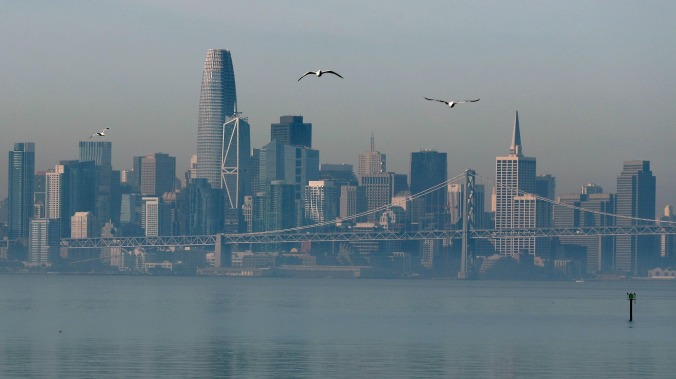Thing we were happiest to learn: Bangor rallied around the lost tourist. It didn’t really sink in that Kreuz had made a mistake when his hotel wouldn’t let him continue on for another night—it was completely booked for University of Maine parents weekend. He hailed another taxi and asked to go to San Francisco, and the cabbie managed to convey that he was on the wrong side of the country. Undaunted, Kreuz went to a bar, asking for directions to San Fran; someone overheard him and called his friends who spoke German. They also owned a German restaurant in nearby Old Town, where they took Kreuz, explained the situation, and promised to help him.
Kreuz became a local celebrity. He was given the key to the city, was the guest of honor at Oktoberfest, met the governor and state secretary of state, was made an honorary member of the Penobscot tribe, and gifted an acre of land in northern Maine. He was taken on all manner of local sightseeing trips, and celebrated his 50th birthday at the German restaurant whose owners had helped him. At his own request, he also visited McDonald’s and took a turn flipping hamburgers. His story went nationwide, getting told in Time, the Associated Press, the CBS Evening News, and the Today show. When the San Francisco Examiner picked up the story, the paper offered to fly Kreuz to the West Coast for the remainder of his trip. He was given the key to that city as well, a banquet was thrown in the real Chinatown, and he got to enter the ring at Grand National Rodeo. However, Kreuz said he preferred Bangor, based on his initial warm welcome, and San Francisco’s lack of trees. Once back in Germany, he said, “If Kennedy can say, ‘I am a Berliner,’ then I am a Bangor.”
Thing we were unhappiest to learn: Kreuz’s fame was fleeting. He was invited back to Bangor the following year, for the ribbon-cutting at the local mall (the first one Kreuz had ever seen). But he was fired from his job at the brewery for taking a month-long trip. Tensions at work had been rising, as Kreuz chafed against the company trying to capitalize on his fame, and he had admitted in an interview that he drank a competitor’s beer, as the brand he helped make wasn’t distributed near his home. He returned to Bangor again in 1979, this time at his own expense, and found a German tourist going to Bangor deliberately had somewhat less novelty than one arriving by accident—the people who had made him a celebrity had now lost interest. He never returned to America, although he did continue to pay taxes on his acre of land.
Best link to elsewhere on Wikipedia: Kreuz was also introduced to another Bangor local celebrity, this one a permanent resident. Andre The Seal was a harbor seal pup found in Penobscot Bay by harbormaster Harry Goodridge. He raised the pup, hoping it would be a scuba diving companion, but assuming the seal would soon return to the wild. He never did, acting as constant companion to Goodridge until his death in 1986 (the seal’s, not the harbormaster’s). Andre was the subject of several books, a PBS documentary, and 1994 film Andre, starring a young Tina Majorino as a girl who raises a seal pup caught in a fishing net.
Further down the Wormhole: Kreuz’s acre of land was nowhere near Bangor. It was outside of St. Francis, a very small town on the U.S.-Canadian border (the population was less than 500 people at the last census and couldn’t have been much bigger in 1977). The longest international border in the world, our border with Canada is also one of the most peaceful, but it was not always so. As both countries’ settlers pushed west, there were several disputes over a western border that ended up simply being a straight line. The final one of these was the Pig War, a skirmish over a few small islands between Seattle and Vancouver. We’ll revisit the final battle between the U.S. and Canada next week.









































